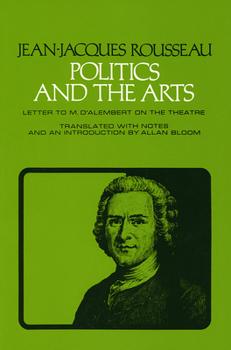Politics and the Arts: Letter to M. d'Alembert on the Theatre
Select Format
Select Condition 
Book Overview
This excellent translation makes available a classic work central to one of the most interesting controversies of the eighteenth century: the quarrel between Rousseau and Voltaire. Besides containing some of the most sensitive literary criticism ever written (especially of Molière), the book is an excellent introduction to the principles of classical political thought. It demonstrates the paradoxes of Rousseau's thought and clearly displays the temperament...
Format:Paperback
Language:English
ISBN:0801490715
ISBN13:9780801490712
Release Date:October 1968
Publisher:Cornell University Press
Length:196 Pages
Weight:0.45 lbs.
Dimensions:0.5" x 5.1" x 7.5"
Age Range:18 years and up
Grade Range:Postsecondary and higher
Customer Reviews
2 ratings
Rousseau's Blast Against Falstaff as King
Published by Thriftbooks.com User , 19 years ago
In this work Rousseau took to task the French theater and, to a great extent, much of what passed for enlightened thinking about censorship and republican government. It is difficult for a modern reader to tolerate his arguments after they have largely been displaced by the concepts of our own Media age: the essential goodness of total freedom of the arts, uncensored publications, and all that goes with these. Rousseau's rhetorical criticism of the theater, and the French Enlightenment figures, such as Voltaire, is carefully considered and extensive. He separates the intellectual deceits from what he considers bedrock issues, such as the absolute importance of a virtuous citenzry, and offers up a strict, severe Calvinist indictment of the foibles of passing off political thought as scientific reasoning. Rousseau makes no cheap arguments - his attack on the French theater is not predicated on some cheap vulgar play deserving of our disdain, but instead he confronts Moliere's masterpiece, the Misanthrope. And Rousseau shows in a magnificent reading of the play, which he admires, how Moliere deliberately subverts the truth for the effect of comedy. In this, Rousseau believes, virtue has been damaged more than we recognize. Rousseau believes comedy, and comic characters, strike at the heart of society's greatest strengths, pride in civic virtue, unity of purpose, repect for its leaders. He concludes that the theater is far more dangerous than the simple divertisement and amusement we think it, that supporters would have us believe. And he roundly rails against those who suggest the theater has the ability to improve society. Much of what Rousseau argues echoes in our own society. However reactionary it all sounds at first, there is a deeply troubling truth in the pictures he draws of the duplicity behind Enlightenment pronouncements. He is also quick to point out conceited Philosophical attitudes devoid of any strict self-appraisal or self-criticism. Much of what he writes sounds almost upside down from modern accepted belief. Harsh it certainly is, but Rousseau is very challenging, and his final words, for this essay was written near the end of his life, are not easily dismissed as final rantings of old age and bitterness with the future. Although I am certainly not a conservative, I would suspect this book would be interesting to anyone holding such political views. For others, it offers a chance to see the darker side of what many of us take too readily for granted: freedom of press, an open - wide-open - popular theater (i.e. the movies) and the certaintude that many Democrats have in the absolute rightness of their beliefs. Rousseau throws buckets of cold water on all of us, and plays Prince Hal as King to our infatuation with the Falstaffian ethos. There is an excellent and very necessary introduction by Allan Bloom.
A counter-blast to the trumpets of elitism
Published by Thriftbooks.com User , 22 years ago
In this work, Rousseau replied to an article in the great "Encyclopedie" penned by D'Alembert. The article concerned Rousseau's hometown -- Geneva, and D'Alembert was for the most part quite complimentary about that city. But he did quarrel with the absense of any theatre. He was surprised, he said, that "in a city where proper and correct theatre is forbidden, coarse and silly farces as contrary to good taste as to good morals are permitted." Rousseau was right to see elitism in those words. The intellectuals of D'Alembert's crowd naturally thought that they could decide for everybody what it "proper and correct," what is "coarse." Rousseau was right, furthermore, to issue this counterblast.I'm not an advocate of every sentiment here, but I think I get the general drift of Rousseau's contention about art, festivals, and the public good. And I believe he got the better of the argument.






